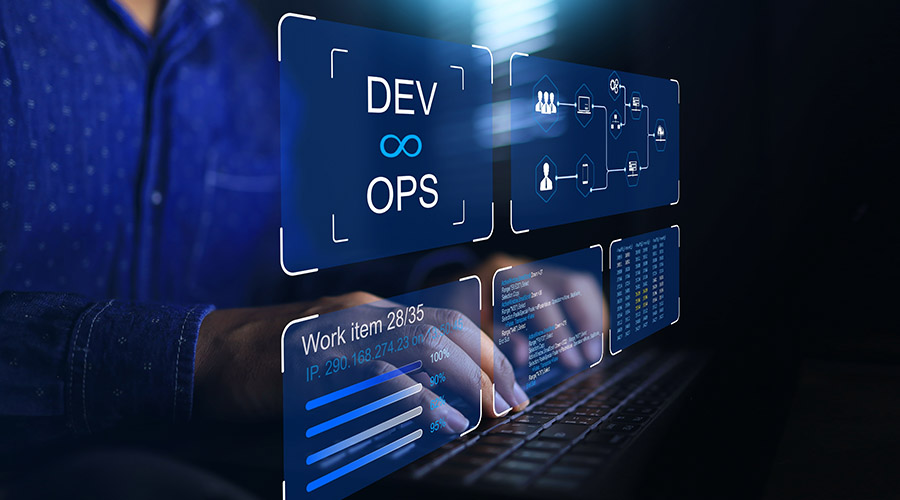As of the middle of 2022, DevOps is the most practiced software development methodology worldwide, used by over 35 percent of software development teams. So, it stands to reason that today’s digital world needs more DevOps professionals to fill the roles, including DevOps engineers.
Consequently, we present this article to show you how to become a DevOps engineer. We will explore the definition of DevOps, the roles and tasks of a DevOps engineer, what skills you need, and even how to get into DevOps with little direct experience.
But first, let’s look at some definitions.
What is DevOps?
DevOps is a fusion of cultural philosophies, tools, and practices that improves a company’s ability to quickly deliver applications and services, evolving and improving products faster than developers using conventional software development and infrastructure management processes.
DevOps shortens development lifecycles and facilitates the continuous delivery of high-quality software.
Also Read: DevOps Tutorial: How to Install Docker on Ubuntu?
What is a DevOps Engineer
DevOps engineers introduce tools, methodologies, and processes to balance needs during the software development lifecycle, everything from coding and deployment to maintenance and upgrades/updates.
DevOps engineers are IT professionals who work with software developers, system operators, and other related production IT staff to guide and oversee code releases and deployments.
What Does a DevOps Engineer Do?
Organizations rely on DevOps engineers for a variety of tasks. Here’s a list of DevOps engineers’ responsibilities, roles, and duties.
- Creating, unifying, and automating infrastructure and its related processes
- Developing Continuous Integration and Continuous Deployment (CI/CD) pipelines
- Creating and configuring container orchestrators
- Working closely and collaborating with developers to create well-designed microservices architecture
- Designing infrastructure and deployment roadmaps, also called DevOps strategies
- Developing observability platforms and recommendations for different teams
- Ensuring the security of all workloads and infrastructure
You can also break down the DevOps engineer’s workload into the following categories of roles and responsibilities:
- Writing and editing code. DevOps engineers typically spend some time writing and improving code. They review software scripts and find ways to improve automation and resolve user interface problems. Although many DevOps engineers delegate coding to software developers, they still need to understand coding languages so they can provide helpful, accurate advice on workflow issues.
- Project management. DevOps engineers are essential for creating strategic plans for implementing goals. They conduct a risk assessment, cost analysis, and benefits, set operational expectations, and develop timelines by forecasting future projects. They are also asked to consult on workflow management and formulate a plan for achieving those goals across departments.
- Overseeing and tracking staff communication. DevOps engineers help the tech support department grasp new software developments. They also manage feedback and suggestions from team members on improving project development. In addition, DevOps engineers oversee how workflow evolves, updating team members through clear communication channels. DevOps engineers can identify workflow issues and solve them by tracking how team members communicate via back-end software apps.
- Server administration. DevOps engineers monitor and improve the organization’s servers and networks. They create and update user accounts and permissions and ensure the server information is consistently and securely backed up. DevOps engineers review system logs to find glitches and human error and set standard procedures for the teams to follow when creating changes or troubleshooting issues.
- Maintaining security. DevOps engineers ensure the safety of company data by integrating security measures with software processes and seeing that updates or other changes don’t create vulnerabilities.
- System performance testing. DevOps engineers conduct tests on the effectiveness and efficiency of appropriate software tools. This process is also called quality assurance or QA software testing. Engineers evaluate the effectiveness of each programming method as it relates to its task.
- Coaching and evaluating. DevOps engineers assess team performance and compose development plans for improving communication skills. In addition, they identify skill gaps within the staff and create intuitive systems to fill those gaps through training.
- Prototyping. DevOps engineers create software tool prototypes and present them to development teams for implementation. They explain how systems must be configured and identify the issues code updates should address.
Also Read: A DevOps Engineer Job Description for Aspiring Professionals
How to Become a DevOps Engineer: Skills Needed
As you probably inferred from the long list of responsibilities and tasks, DevOps engineers need a serious set of eclectic skills. However, everyone seems to have a different list of required skills, although there’s consiHow to Become a DevOps Engineerderable overlap in most cases.
But here’s our take on the skills you will need to become a DevOps engineer. Just keep two points in mind:
- Because the role of a DevOps engineer is fluid and varied, there’s no right way to become one, and you can even begin from the point of complete inexperience.
- There is no such thing as having too many skills!
We’re dividing our skills into mandatory tech skills, specific DevOps tech skills, and soft skills.
How to Get into DevOps: Mandatory Tech Skills
Basic programming
It would help if you had a basic grasp of programming concepts like algorithms, arrays, lists, loops, variables, and design patterns. Knowing a programming language like Python or Ruby is a huge plus.
Linux/Unix OS fundamentals
Linux is an open-source operating system that is based on Unix and is overwhelmingly used in the public cloud. Learn about the most popular Linux distributions like Centos, CoreOS, RHEL, and Ubuntu.
Bash
To automate tasks in a Unix environment, you need to know the Bash scripting language.
Cloud platform fundamentals
Cloud computing continues to be a popular resource in today’s digital world, so you should familiarize yourself with a platform such as AWS, Azure, or GCP.
Git
Git is a widely used distributed version control system that tracks code changes and is a must for any software engineering and operations team.
Networking fundamentals
Networks play a significant role in today’s IT operations, so you need a basic understanding of concepts such as routers, switches, IPs, etc.
Specific DevOps Tech Skills
Continuous Integration (CI), Continuous Delivery (CD) and Continuous Deployment
This skill is tremendous because CI/CD pipelines are essential to the software company’s production line. The CI pipeline involves building and testing code to ensure it’s suitable for primary branch integration, while the CD pipeline ensures the code can be deployed. Learn tools like Gitlab CI and Jenkins.
Containers
Containers package and isolate the applications that the DevOps team runs. Developers often use containers in CI/CD pipelines and production workloads. For best results, learn Docker.
Container orchestrators
This resource lets DevOps engineers run containers across one or more servers and scale the workload horizontally. Kubernetes is the most popular container orchestrator, so you should definitely learn it.
Cybersecurity
Every aspect of IT relies on robust security, especially since cybercrime is so prevalent. In addition, DevOps engineers may be called on to design secure systems, so it’s vital to earn certifications in subjects such as ethical hacking or CompTIA+.
Infrastructure as code (IAC)
This concept involves creating, configuring, and updating an infrastructure by writing and applying the code instead of manually creating it. In addition, you should learn about tools such as Ansible, Packer, Terraform, or CloudFormation.
Microservice architecture
Microservices architecture is an alternative to traditional monolithic architecture. Microservices allow developers to isolate data, independently scale, and isolate faults.
Monitoring and observation
Engineers monitor systems to look for potential issues and use observation to forecast potential problems and performance trends. So, DevOps engineers should get acquainted with concepts such as distributed tracing, metrics, logging, and service level agreements (SLA).
Software reliability engineering
Also called SRE, this skill entails applying software engineering principles toward implementing and improving an organization’s distributed systems.
DevOps Engineer Soft Skills
Agile
Agile consists of principles that empower engineers to perform continuous and short release cycles faster and more efficiently by accommodating spontaneous requirement changes and building better communication with clients and stakeholders. For best results, learn about Scrum and Kanban, and read the Agile Manifesto. And speaking of communication.
Communication
This skill includes learning how to write effectively, concisely, clearly, and in a way that is easy for non-tech readers to grasp. Of course, this also includes verbal communication.
Social skills
This skill covers everything from giving and receiving feedback and criticism, knowing how to carry on a conversation, and how to be approachable.
Also Read: What is Azure DevOps? A Complete Guide
How to Become a DevOps Engineer
So, you’ve decided to become a DevOps engineer. How do you pull this off? And just how long does it take to become a DevOps engineer, anyway?
As far as that last question goes, the more technical background you have, the faster you will meet your goal. If you already have some primary Linux network and administrative skills in place, you can make it in about six months.
Here’s a simple breakdown of the DevOps engineer career process:
- Get acquainted with the DevOps culture by searching for online resources that address the topic.
- Learn a programming language such as Python.
- Make sure you have a solid understanding of Linux/Unix.
- Develop an understanding of how infrastructure components work and interact. This step means getting acquainted with storage, networking, high availability, load balancers, security, and single sign-on.
- Gain certification in one of the popular cloud platforms, especially Google Cloud Platform or Amazon Web Services.
- Educate yourself on infrastructure automation since manual server creation is becoming obsolete.
- Learn CI/CD pipeline processes using tools such as Jenkins.
- Learn container orchestration tools like Kubernetes.
- Learn about DevOps security best practices.
- Practice using Git and GitOps, taking advantage of online tutorials.
- Research various DevOps positions.
- Rewrite your resume/CV to emphasize related experience, education, and DevOps-oriented skills.
- Apply to a wide range of DevOps positions. DevOps is, by its very nature, not an entry-level position. Instead, DevOps engineers are typically professionals who have measurable IT experience and want to make a move into a new career.
Tips for New DevOps Engineers
Now that you have a better idea of how to become a DevOps engineer, here are a few bits of advice for newly minted DevOps engineers.
- Automate as much as possible. You save time in the long run if you can automate redundant tasks. The time you spend setting up the automated process will be regained tenfold.
- Document everything. If you document your processes, you guarantee a certain level of consistency. It will also be handy for your successors or if you are unavailable.
- Work hard at design and relax later. If your design gets it right the first time, less of your future time will be spent troubleshooting and putting out fires.
- Be a good communicator. A good DevOps professional doesn’t just have solid technical understanding; they are also good at talking with people such as their teams’ members, managers, and stakeholders.
- Be open to change, but don’t do it for change’s sake. Only make changes when the need is clear.
- Take the initiative. Don’t wait to get assigned something; take note of what needs improving and do it!
- Don’t drink from the firehose. There’s a lot of knowledge out there and so many skills that DevOps engineers could benefit from. So don’t try to learn them all at once. Instead, prioritize your learning based on what your role needs.
Do You Want to Become a DevOps Engineer?
You may have noticed how much of being a DevOps engineer hinges on learning the right skills and certifications. This online DevOps bootcamp will help you become a DevOps engineer in just nine months.
This bootcamp helps you bridge the gulf between software development and operations. You will choose hands-on skills through industry projects in continuous deployment and use configuration tools such as Ansible, Puppet, Chef, and SaltStack. You will learn the following:
- Cloud Platforms
- Configuration Management
- Containerization
- Continuous Delivery
- Continuous Integration
- Deployment Automation
- DevOps Methodology
- DevOps on Cloud
- Source Control
According to Glassdoor.com, DevOps engineers earn an average of $132,219 annually. So don’t delay; check out this valuable DevOps bootcamp today and get started on a remarkable new career that offers excellent opportunities, job security, and fantastic rewards!






